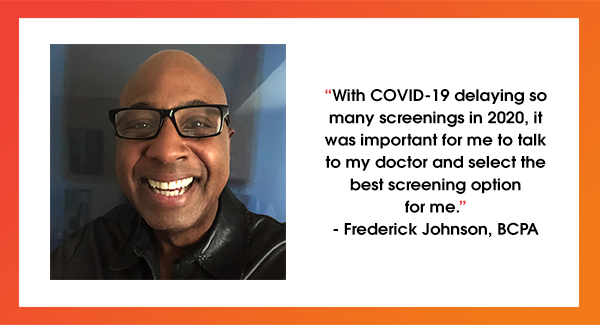Stand Up To Cancer employee, Frederick Johnson, shares his story, his experience undergoing a routine colonoscopy in the midst of COVID-19, and the importance of recommended screenings for this disease.
Colorectal cancer, which occurs in the colon or rectum, is the second most common cause of cancer death in the US in men and women combined. But it doesn’t have to be. With regular screening, colorectal cancer is one of the most preventable cancers and is beatable in 90% of cases when caught early.
As an employee at Stand Up To Cancer for over a decade, I decided to share my own colonoscopy experience to help encourage others to talk to their doctors about which colorectal cancer screening may be right for them.
In 2008, my dad unfortunately passed away from colorectal cancer. Due to my family history of the disease, my doctor recommended I have my first colonoscopy at the age of 40. Following that screening, I was advised to get another colonoscopy in 10 years. As I approach my 50th birthday, it was important for me to talk with my doctor about screening options, especially with the pandemic delaying so many screenings in 2020.
There are several effective tests available – from a colonoscopy done at a medical facility to non-invasive tests that can be done from the comfort of your own home. For me, a colonoscopy was the right choice. And since this is my second, I know the process and procedure isn’t that bad, and it’s well worth it because it could help save your life.
While researching my options, I learned that colorectal cancer disproportionately impacts the Black community. Black and Hispanic Americans are more likely to have colorectal cancer diagnosed at later stages due in part to differences in access to screening and health care. I also learned that most people with colorectal cancer have no family history of the disease.
With millions of people in the US not getting screened as recommended, and many people delaying routine appointments due to the pandemic, it’s more important than ever to know your screening options and reschedule missed tests. If you are 45 or older, talk to your medical provider about a screening test that is right for you.
If you’d like to learn more about my experience, you can follow my entire journey here.
I’m thankful to work for an organization focused on saving lives. And I’m proud to Stand Up To Cancer and get screened for my father, myself, and the future. Stand Up To Cancer for yourself and your loved ones by learning more about the benefits of colorectal cancer screening at StandUpToCancer.org/ColonCancer.
My best,
Frederick Johnson, BCPA

